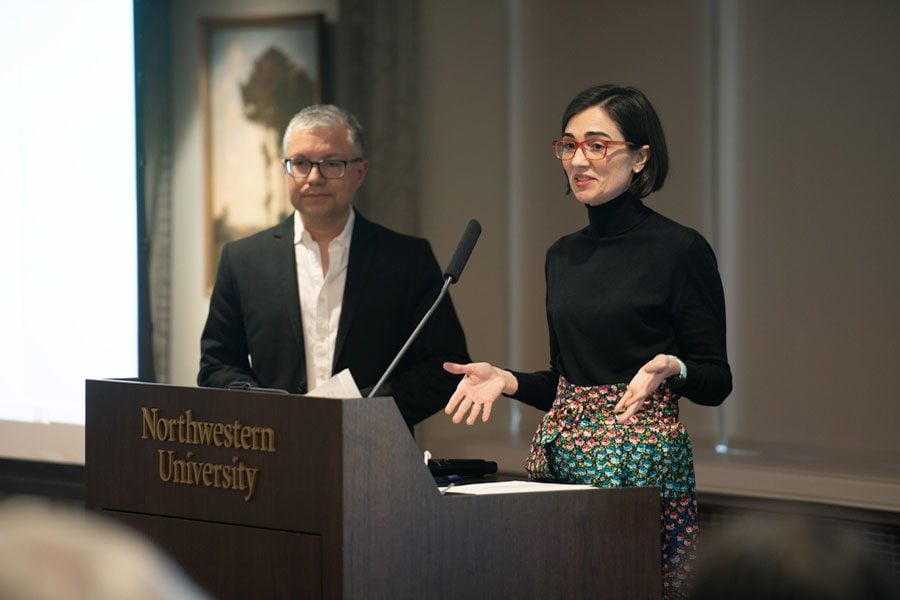Faculty Senate asks Provost’s Office to create position supporting non-tenure eligible faculty
Evan Robinson-Johnston/Daily Senior Staffer
Elsa Alvaro, right, and Baron Reed, left. Alvaro, the chair of the NTE committee, said a position in the Provost’s Office to support NTE faculty was necessary to “harmonize” the disparity of policies and practices across schools.
April 15, 2019
Faculty Senate voted last week in favor of a resolution asking the Provost’s Office to explore creating a position to support faculty not eligible for tenure, a role cut last year as part of the University-wide staff layoffs to close the multimillion-dollar budget gap.
The resolution demonstrates the Senate’s support of the creation of the an assistant provost role to oversee non-tenure eligible faculty across the University, as well as the reinstatement of a similar role for Weinberg faculty. Elsa Alvaro, a University librarian and chair of the committee that introduced the measure, said it was necessary to create an “equitable community,” achieve transparency and better address NTE faculty concerns.
The resolution will now be sent to Provost Jonathan Holloway, whose office will consider the proposal and return with comments. Holloway said in a Wednesday email to The Daily that he would have to “look at the resolution before offering any comment,” which will first go to Faculty Senate.
The measure was initiated when Weinberg faculty asked Faculty Senate’s NTE committee to support a petition to reinstate the associate dean position in Weinberg. Alvaro said the committee went a step further to advocate for a University-wide position.
“Northwestern should be an academic community in which all faculty are provided with the institutional support to thrive,” Alvaro said, reading the resolution.
Non-tenure faculty have long raised grievances for the lack of advancement opportunities, pay disparity and other unequal working conditions. NTE faculty sought to address these concerns through unionization, though the vote failed in October after the National Labor Relations Board granted NU’s request to include 25 contested ballots in the final tally.
[Looking back at NU faculty efforts to form non-tenure eligible union]
Mark Witte, an economics professor not on a tenure track, said the Weinberg associate dean position for NTE faculty in Weinberg left him “reasonably happy.” Still, he would support unionization if he continues to see “mistreatment” of other NTE faculty.
“It would be good for me personally and good for these faculty — who are perhaps not as well cared for as we are in Weinberg — to have something at the provost level that would try to make sure that everybody’s needs are at least attended to a couple times a year,” Witte said.
The resolution, which passed without opposition, arose out of a need to “harmonize” the disparity of policies and practices across schools, Alvaro said.
The experiences of faculty vary across schools. Some have multiple opportunities for promotion, like in the Feinberg School of Medicine, while others do not, Alvaro said. The length of working contracts is also inconsistent, with some as short as one year, as are hiring, evaluation and promotion processes.
Such a position would provide much-desired support for a group that many say is hard to define.
“The category of non-tenure-eligible faculty is enormously complex, with variation across the schools in titles, career paths, and contract structure,” Baron Reed, Faculty Senate president, said in an email to The Daily, noting that these faculty include lecturers, researchers, librarians and other positions. “Our recommendation is to have someone in the administration whose primary role is to keep track of these many different sorts of faculty, so that they are in the best possible position to continue contributing to the university’s success.”
The Weinberg position was cut in July after University leadership began to recognize the depth of what turned out to be a $94 million budget deficit, resulting in about 80 layoffs and the elimination of an additional 80 positions in central administration. Schools made additional layoffs after they were directed to make spending cuts of their own.
Among the multiple concerns from faculty about spending cuts was the termination of this position.
At the meeting, Chairman of the Board of Trustees J. Landis Martin assured faculty that he understood concerns that some cuts to spending seemed unfair, but said he wants “to do my part to make sure that the Board and the president are in lockstep and doing things the right way.”
Reed recognized the constraints of the budget, but expressed hope that a solution is possible.
“We’re aware that this request may be difficult to accommodate, for the moment at least, with the constraints imposed by the need to close the budget deficit,” he said. “But we look forward to continuing to work with the Provost and his office to find creative and equitable solutions to the concerns NTE faculty face.”
Correction: An earlier version of this story incorrectly stated that a position to support NTE faculty in the Provost’s Office was cut amid the University budget deficit. It was the position in Weinberg that was cut — no such position in the Provost’s Office had existed at the time of spending cuts.
Email: [email protected]
Twitter: @_perezalan_












